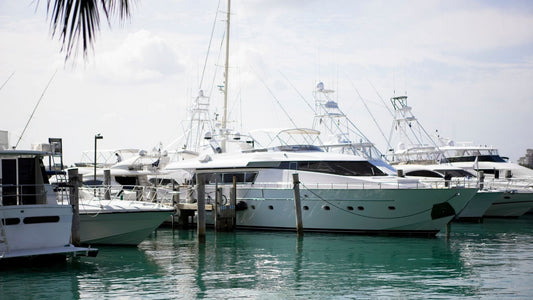
Why Do Fishing Boats Have Insulators on Their Lines?
Nicholas HeislerShare
If you've ever taken a closer look at fishing boats, especially commercial fishing vessels, you may have noticed that some of them use insulators on their fishing lines. This might seem unusual at first glance, leading you to wonder the purpose. The use of insulators on fishing lines is more than just a curious feature-it plays a vital role in the fishing process, particularly in the practice of deep-sea or longline fishing. Let's delve into the reasons behind this practice, the science involved, and the benefits it provides to both fishermen and the marine environment.
Table of Contents
- The Purpose of Insulators on Fishing Lines
- The Science Behind Insulators
- Benefits of Using Insulators on Fishing Lines
- Types of Fishing Where Insulators Are Commonly Used
- How to Maintain Insulators on Fishing Lines
The Purpose of Insulators on Fishing Lines
Insulators on fishing lines serve a critical function in ensuring the safety and effectiveness of the fishing process. Here are the primary reasons why insulators are used:
- Electrocution Prevention: When fishing boats use electric current in the water, such as during electrofishing, insulators are necessary to prevent the current from traveling up the fishing line and potentially electrocuting the fishermen. Insulators block the current, ensuring that it does not pose a risk to anyone handling the line.
- Reducing Galvanic Corrosion: Fishing lines often come into contact with metal components, which can lead to galvanic corrosion-a process where two different metals in contact with an electrolyte (such as saltwater) corrode at different rates. Insulators help break the electrical circuit that can cause this type of corrosion, thereby prolonging the life of the fishing gear.
- Electrofishing Techniques: In some types of fishing, such as electrofishing, an electric current is passed through the water to stun or attract fish. The insulators are crucial in this scenario to ensure the current only affects the intended area and does not travel back through the boat's conductive parts or lines.
- Protecting Sensitive Equipment: On modern fishing boats, electronic equipment is used for navigation, communication, and fish finding. Insulators help protect these sensitive electronics from stray currents that could cause malfunctions or damage.
The Science Behind Insulators
Insulators are materials that do not conduct electricity, meaning they do not allow electric current to pass through them easily. Common materials used as insulators on fishing lines include rubber, plastic, or ceramic. These materials are strategically placed along the fishing line or near metallic components to ensure that any electric current in the water does not travel up the line and come into contact with fishermen or electronic equipment on board.
In the context of galvanic corrosion prevention, insulators work by interrupting the electrical pathway that would otherwise lead to the exchange of electrons between different metals, slowing down the corrosion process.
Benefits of Using Insulators on Fishing Lines
Insulators provide several benefits to fishing boats, especially in commercial settings where safety and efficiency are paramount:
- Enhanced Safety: The primary benefit of using insulators is safety. By preventing electric currents from traveling up fishing lines, the risk of accidental electrocution is minimized, protecting crew members.
- Prolonged Equipment Life: Insulators help reduce the rate of galvanic corrosion on metal parts, extending the lifespan of expensive fishing gear and reducing replacement costs.
- Improved Fishing Efficiency: In methods like electrofishing, insulators ensure that the electric current is used effectively and precisely, maximizing the chances of a successful catch without damaging the boat or equipment.
- Environmental Considerations: Effective use of insulators can help prevent unintended harm to marine life. By containing electric currents, fishermen can target specific species without affecting others, making fishing practices more sustainable.
Types of Fishing Where Insulators Are Commonly Used
Insulators on fishing lines are most commonly found in the following types of fishing:
- Longline Fishing: In longline fishing, a main fishing line with numerous baited hooks is deployed. Insulators are often used in this method to prevent electrostatic charges or currents from traveling along the long lines and hooks, which could affect fish behavior or damage equipment.
- Electrofishing: This method is primarily used for research and sampling in freshwater environments. It involves using a direct electric current to temporarily stun fish for easy capture. Insulators are critical in this type of fishing to protect the crew from electric shocks.
- Trolling: For boats that use downriggers or other metallic components in trolling, insulators can prevent any accidental currents from affecting the trolling lines or attracting the wrong type of fish.
How to Maintain Insulators on Fishing Lines
To ensure insulators remain effective on fishing lines, regular maintenance is necessary:
- Regular Inspection: Inspect insulators regularly for signs of wear, cracking, or damage. Saltwater and sun exposure can degrade materials like rubber and plastic over time.
- Clean Thoroughly: Clean insulators regularly to remove salt, debris, and fish residue. Use fresh water and mild soap to prevent salt buildup, which can lead to corrosion on nearby metal parts.
- Replace When Needed: If an insulator shows signs of significant wear or damage, replace it immediately to maintain safety and functionality.
- Proper Storage: When not in use, store fishing lines and insulators in a cool, dry place, away from direct sunlight, to prevent UV damage and material degradation.
Conclusion
Insulators on fishing lines may seem like a small detail, but they serve a critical role in ensuring safety, efficiency, and longevity in various types of fishing. By preventing electrical currents from causing harm or corrosion, insulators protect both the fishermen and their valuable equipment. For anyone involved in commercial fishing or interested in the technical aspects of fishing gear, understanding the purpose and benefits of insulators can help ensure a safer and more successful fishing experience.
When it comes to keeping your boat clean, look to Captains Preferred Products boat brushes and boat cleaning supplies. Find everything you need to keep your vessel squeaky clean all season - always at the best prices.




